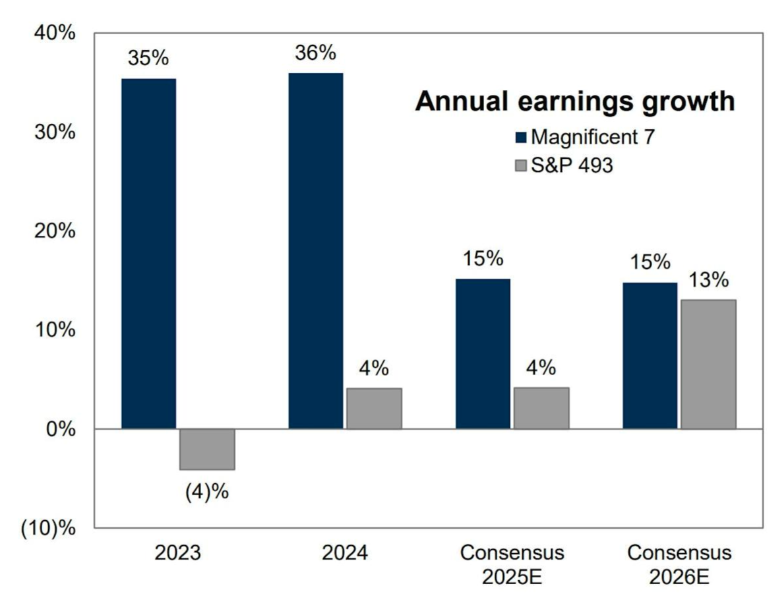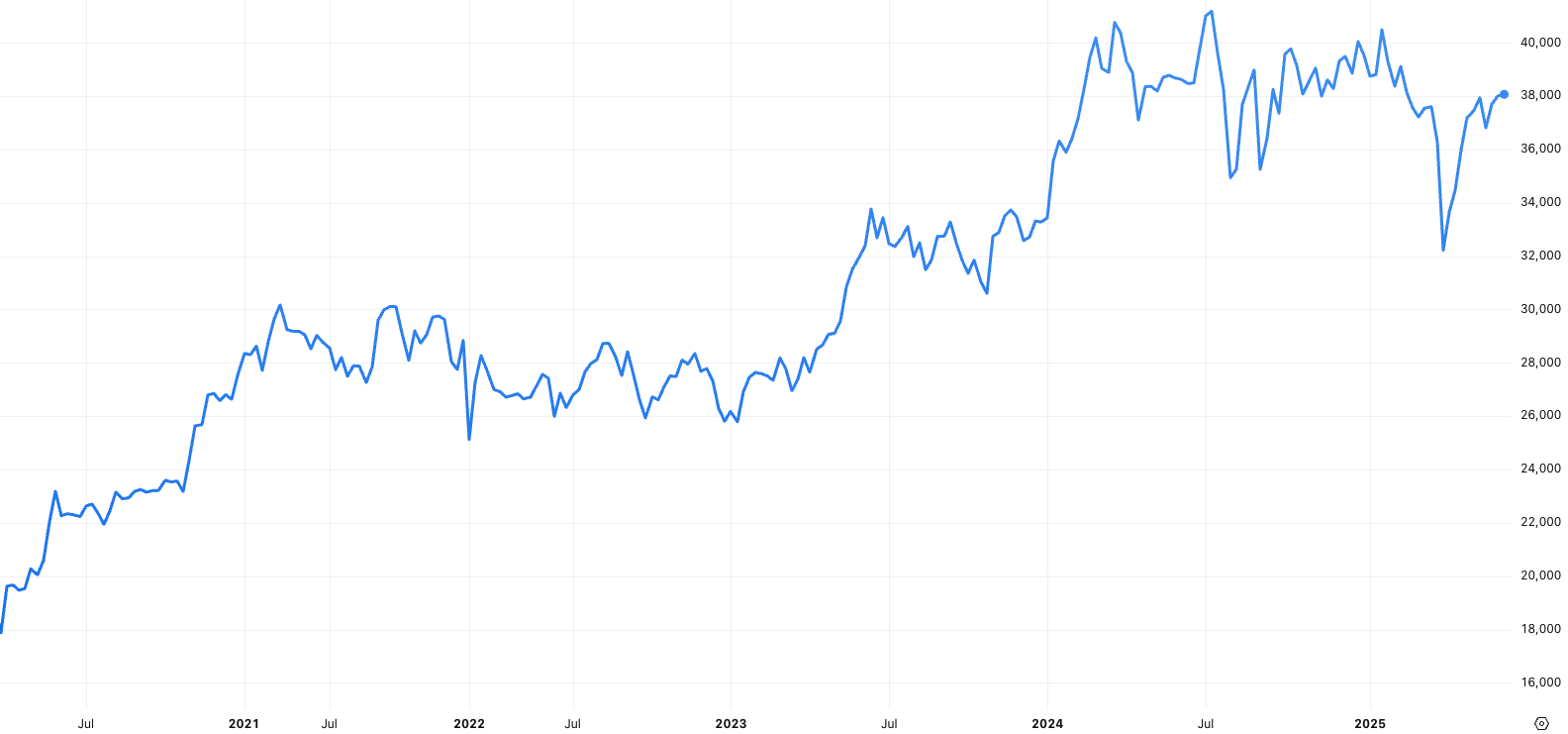Australia offers “US multiples for European growth”, says Gerard Minack
Independent macro advisor, Gerard Minack, isn’t afraid of sharing his views on Australia, the US or anywhere else.
Speaking at the 7th Morgan Stanley Australia summit in Sydney this week, Minack outlined why US outperformance could be coming to an end, what Australia needs to do to fix its productivity issues, and most interestingly, why Japan could become the land of the rising stock market.
Ailing America
Minack brings up a chart showing that total returns for global equities ex-US have doubled since 2007. Over the same period, the US has posted a sixfold increase.
“Whichever way you measure it, the US has been exceptional. I've always argued that this US outperformance had nothing to do with things like QE or interest rates. It always came down to better corporate fundamentals,” said Minack.
“Ultimately performance is driven by profits and there's this huge gap between EPS in the US and the rest of the world.”
He points to the fact that US real EPS growth has hit 4% over the last decade, more than twice the historical norm. And there’s a very obvious reason why - the Mag 7.
If you take the performance of the rest of the S&P 500 - the S&P 493 - US EPS growth has been in line with the rest of the world.
“It's the Mag 7 that made the US exceptional.”
But while those businesses prospered during Covid, they have effectively become a somewhat self-reinforcing AI trade.
“We're seeing the same dynamic between profits and capex that we actually saw in the late 1990s tech bubble,” he says.
“If Microsoft spends $100 million on NVIDIA chips, NVIDIA's going to report a $90 million profit. Microsoft doesn't report a $100 million expense - it's a depreciation charge of about $15 million.”
“So spending a hundred million dollars on capex boosts Mag 7 profits by about $75 million. This is a marvellous self-reinforcing dynamic", adds Mincack.
Eventually, investors are going to channel Jerry Maguire and demand to see where the money is coming from on AI, says Minack.
The natural moats and competitive advantages that have helped Meta, Google and others dominate probably don’t apply to AI. The barrier to entry is lower, and so will be the margins.
Throw in tariffs, deficits, a Trump-induced supply-side shock, and falling GDP growth as the US population growth slows, and it’s not a rosy outlook for the US.
Mag 7 earnings growth vs the S&P 493

“The US market is trading at a 40% PE premium to the rest of the world. This is going to come down and I think the earnings gap is going to narrow because the rest of the world's earnings are now back on a sustainable growth trajectory.”
“We are going to see the US come off the boil.”
Australia’s productivity problem
Minack says Australia has become a "stagnation nation" over the last decade or so, as productivity and disposable incomes per capita have dropped.
The productivity issue is dual-faceted. On the one hand, you have extremely high population growth by developed economy standards. On the other hand, you have falling levels of investment.
Less money is being stretched over more people.
“If you look at real wage growth, it's been slowing for some time. This is really a problem with productivity. You can't pay yourself more if you don't become more productive,” says Minack.
Labour is “cheap and plentiful”, while we’ve had a decade of recession-like investment spending, with net investment in the mining sector averaging 0.1% of GDP for the last seven years.
“Mining's doing nothing and manufacturing has disappeared."
Australian industry is also oligopolistic, meaning there’s no real competition. The introduction of franking credits has also led to companies forgoing reinvestment and growth, and dividend payout ratios have ballooned relative to the rest of the world.
Finally, we’ve seen EPS growth average below 5% since 2017, with the Australian stock market now the second most-expensive in the world, behind the US.
“I showed this to a client the other day and he said, “wow, go to Australia and pay US multiples for European growth”, which is actually being rude to Europe, which is going to grow their earnings three times faster than here.”
Minack does offer some no-nonsense solutions to Australia’s current malaise.
One would be to get rid of franking credits and instead drop the statutory tax rate to disincentivise big payout ratios.
Another is to change the migration mix to prioritise skilled labour in areas where we currently have shortages. The obvious focus right now is construction.
Finally, he’s calling for Australia to reserve gas for local consumption and drive down energy prices. We currently pay sky-high gas prices, says Minack, despite being one of the world’s biggest gas exporters.
Turning Japanese
While the outlook for Australia and the US is looking less attractive, Minack sees Japan as the place to be right now.
While China is great at growing earnings, it's also great at diluting them, which leads to lower EPS growth and therefore lower returns.
Japan is doing the opposite, according to Minack.

"I'm a huge fan of Japan," says Minack, before adding, "I think it's got a great structural story and it's notable that Japan is the mirror image of China. Japan's economy has had very little GDP growth, but it has been able to generate significant earnings growth."
"They've paid down their debt, they've caught up ROAs [return on assets] with the rest of the world, and indeed, if you look at earnings, they've out-earned the rest of the world since the GFC."
But the Japanese stock market continues to suffer and now trades at a marked discount to the rest of the world.
That presents an opportunity.
"The day Japan stops de-rating is the day it stops underperforming," said Minack.
Learn more
Information is everywhere; true insight is rare. Morgan Stanley brings knowledge and experience from across the globe to make sense of the issues that matter. Find more insights here.
5 topics

